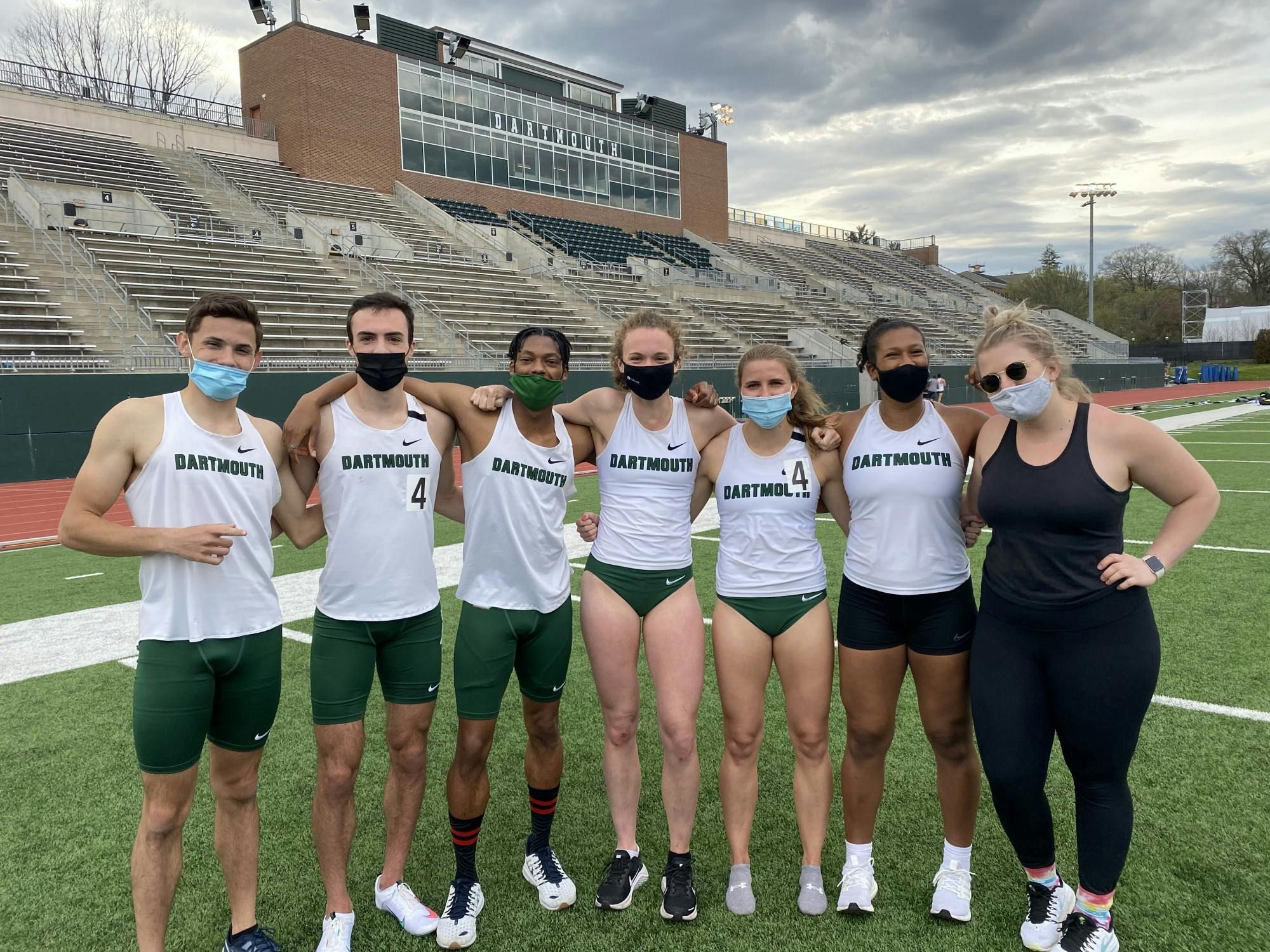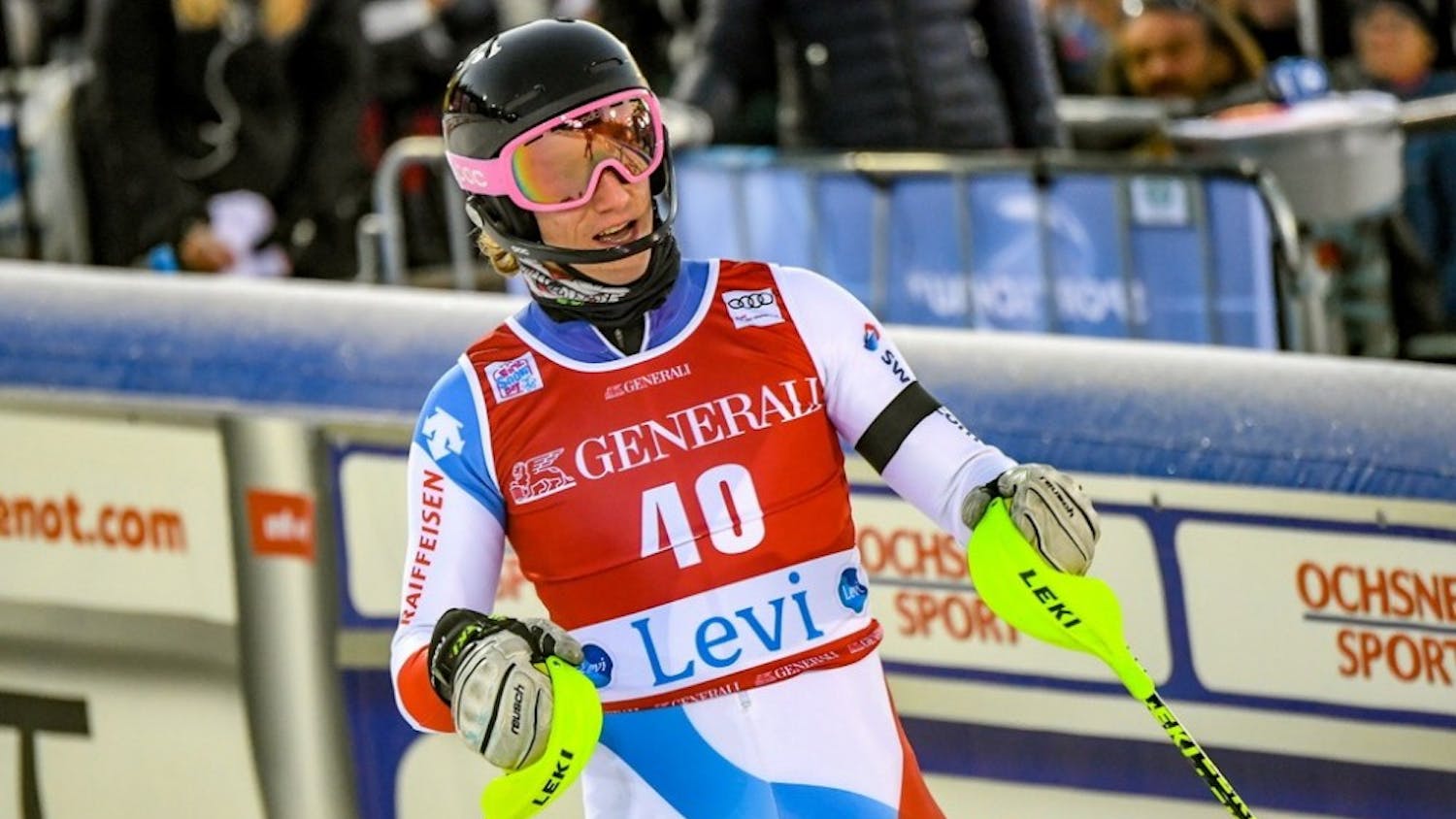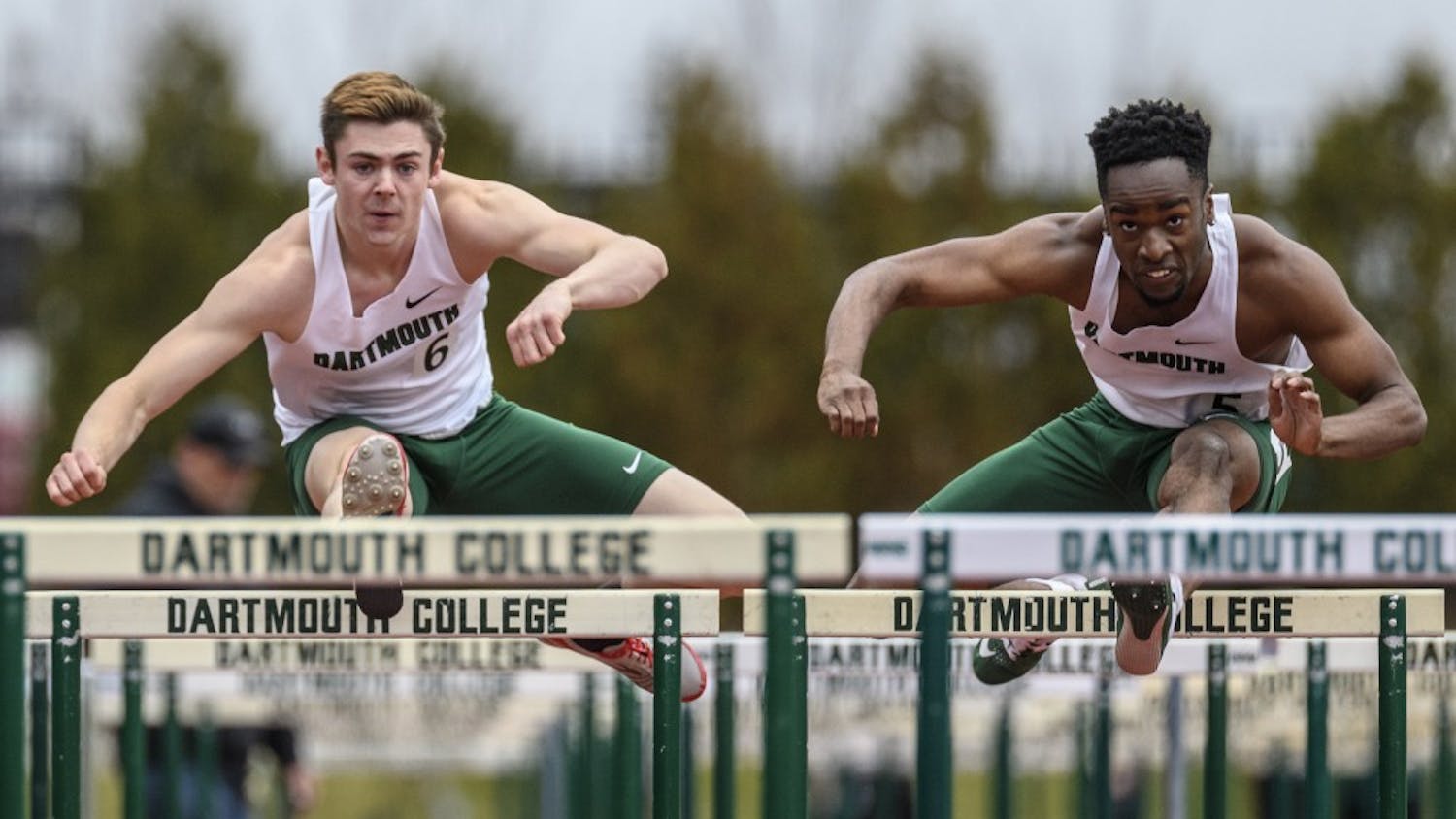It was a day of firsts for the Dartmouth track and field teams last Friday. In their first and only home meet of the season, the women’s team claimed victories in 11 races while the men won 10 events.
Because of the Ivy League’s cancellation of spring interconference competition, the Big Green did not line up against other members of the Ancient Eight at the meet. Instead, Dartmouth hosted local Division I rivals — the University of Massachusetts Lowell, the University of New Hampshire and the University of Vermont — as well as Division III opponent Plymouth State University.
Among the winners were several Big Green freshmen and sophomores competing in their first outdoor races on Memorial Field.
On the women’s side, Emma Cunningham ’23 landed the second-longest triple jump in program history, leaping 12.46m to enter the record books. Anya Hirschfeld ’23 placed first in the 1500m (4:36.65) with Big Green teammates Corinne Robitaille ’23 (4:37.92), Natalie Shapiro ’24 (4:40.46) and Steph Finley ’23 (4:46.58) sweeping the second through fourth spots in their home debuts. The top performer of the day, Bridget McNally ’24, broke out with victories in all three of her events, including the sixth-best long jump (5.75m) and eighth-best 100m dash (12.19 seconds) in team history.
McNally, who set her personal record in all three events, said “it was kind of a shock” setting her personal record in the 200m (24.88 seconds) after she had worn herself out in the 100m and long jump. She said competing at home was beneficial for her performance.
“We had a meet at UNH a couple weeks ago, and I was super nervous and kind of out of it,” McNally said. “But this time, I could really focus and just hone in on what I had to do.”
The underclassmen impressed in their home debuts for the men’s team as well, including Myles Epstein ’23, whose 10.49-second 100m dash set a new personal record and was the third-best time in Big Green history. Declan O'Scannlain ’24 (14:47.85), Trey Cormier ’23 (14:50.13), Colin Donnelly ’24 (14:50.37) and Will Chaffin ’24 (14:52.74) inspired hope for the program’s future with the top-four finishes in the 500m. Other premier home debut performances included Michael Gabriel ’24 winning the hammer throw and Will Daley ’24 falling less than a second behind the winner of the 1500m but running a top-20 time in program history (3:47.83)
As much as Friday was a day of firsts, it was also the last chance for members of the Class of 2021 to compete in Hanover, and for those who do not qualify for regionals in two weeks, it was their final meet for the Big Green. Sprinter Donovan Spearman ’21, who will be running for Duke University next year, discussed the excitement of running one last meet with his fellow seniors and competing with the underclassmen for the first time.
“Just about all the seniors were able to compete, which was a lot of fun because we got to come back together one last time after everything that's happened over these four years,” Spearman said. “It was also really cool to run with the underclassmen and experience a meet with them.”
Max Frye ’21, a co-captain of the men’s team, said it had not yet sunk in for him that Friday was his final home meet, and that given how “weird” this year has been athletically and academically, he and the team were just happy to compete. Amid a challenging final season, he has pushed the seniors to “enjoy what [they] have left here.”
“I think for some of the older folks like the seniors, I've just tried to make sure that they kind of understand that this is our last time to really go out there and compete,” Frye said. “I know it's not ideal circumstances, but we really just have to make the best out of a bad situation. And I think most seniors definitely came at it with the right attitude.”
The seniors demonstrated this competitive mentality in their final home meet, with three senior women and four senior men winning their events. Women’s co-captain Camille Landon ’21 cleared 1.70m to win the high jump, co-captain Rachel Ludwikowski ’21 took first in the 5,000m by over a minute (17:16.59) and Kathryn Laskoski ’21 ran the 400m in 58.04 seconds to edge out her UVM competitors.
Tim Zepf ’21 led the way for the seniors on the men’s track team, outpacing a crowded field in the men’s 800m by over three seconds with one of the best times in program history at 1:49.45. Corbin Mayes ’21 won the pole vault (4.50m) while Owen Ritz ’21 ran the 10,000m in 30:04.91 to take first in an all-Dartmouth field. Frye, who won the 110m hurdle by 11 seconds with a time of 52.40, now awaits the results of other upcoming meets to see if he will qualify for regionals.
Both Frye and Spearman were happy with the teams’ performances given the difficult training circumstances. Frye said the teams only got to train for about four weeks in the winter because of the late start to the term and the COVID-19 outbreak at the end of the quarter, and spring break and arrival quarantine further complicated building up for the season.
“In a sport like track, you have these cycles, where you peak at certain times, and when you have those peaks interrupted and those cycles interrupted, it's really hard to get the results you want,” Frye said. “... The ebb and flow of our cycles was definitely messed up, but the part that really made it okay was that everyone definitely came ready to work for each practice.”
The COVID-19 athletic protocols in place at Dartmouth presented another challenge for the Big Green — all athletes were required to wear masks at Memorial Field — but Dartmouth has gotten used to wearing masks by practicing with them all season, according to McNally. McNally said there was not a mask requirement at the UNH meet two weeks ago, however. While the Big Green athletes wore their masks, Frye said “a small amount” of athletes from other schools disregarded the rule during their races.
“It's definitely harder to run with a mask,” Spearman added. “It's probably easier for a shorter distance, [but for] the 5k and 10k runners, it's extremely hard for the longer races to run with a mask the whole time.”
In addition to the mask requirement both on and around the track, no athletes were allowed to leave the stadium during the event, and no friends, family or friends were allowed to watch the event. Frye added that each team only brought about 30 people as opposed to the normal 100, and athletes entered through specific gates to ensure social distancing. According to Frye, Safety and Security were on patrol at Memorial Field to ensure athletes and spectators observed restrictions.
As a result of the protocols, many parents waited outside the stadium to cheer on the Big Green seniors as they finished their final events, according to Spearman. After four years of running laps around the Leverone Field House and Memorial Field tracks, Spearman felt everything came “full circle” at the final meet.
“It was just a really great moment being there with all the other seniors after these four years and everything,” Spearman said. “It really did feel like everything came full circle.”




